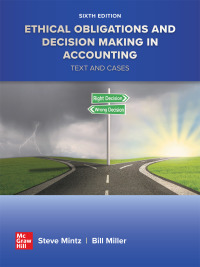In the first three months of 2021, Johnson Pharmaceuticals sales and earnings were declining, placing the company
Question:
In the first three months of 2021, Johnson Pharmaceutical’s sales and earnings were declining, placing the company in financial distress. As a result, Johnson had begun the process of borrowing $1 million to stay afloat.
Around the same time, Paul Leonard, CPA, who had served as Johnson’s Controller since 2004, retired from the company on March 7, 2021. After informally advising his successor (the “Successor Controller”) from March 8 until April 2, Leonard was formally retained by Johnson as a consultant on April 3, 2021 to assist the Successor Controller in closing Johnson’s books for the quarter ending March 31, 2021, and began receiving material, nonpublic information regarding Johnson’s quarterly results and its pending impairment charge.
While in possession of material, nonpublic information, Leonard sold all of the Johnson shares he owned, and he exercised all of his stock options. This enabled Leonard to avoid losses on the stock he sold and profiting on the options he exercised by more than $100,000 in the aggregate.
Becca Lowry, the Successor Controller, who is also a CPA, found out about the sale. Not only that, she discovered that Leonard had borrowed $250,000 from a related party entity and didn’t disclose it in the December 31, 2020, 10-K financial statements filed with the SEC.
Leonard was assisting Becca Lowry in closing the books. Becca wanted to approach Leonard to discuss his stock sales and borrowing. However, she didn’t know how best to do so. Moreover, Becca felt beholden to Leonard for her job and training her to become the new controller.
Questions
1. What rules of conduct in the AICPA Code seem to have been violated? Explain why.
2. Put yourself in Becca’s position. You are preparing for the meeting with Leonard to discuss these matters. Consider the following in crafting an outline of points you may have to respond to.
a. What are the main arguments you are trying to counter? That is, what are the reasons and rationalizations you need to address?
b. What is at stake for the key parties?
c. What levers can you use to influence Leonard?
d. What is your most powerful and persuasive response to the reasons and rationalizations you may need to address? To whom should the argument be made? When and in what context?
3. Assume you are unable to get Leonard to make things right with respect to the stock sales and borrowing, what would you do next? Why?
Step by Step Answer:

Ethical Obligations And Decision Making In Accounting Text And Cases
ISBN: 9781264135943
6th Edition
Authors: Steven Mintz





